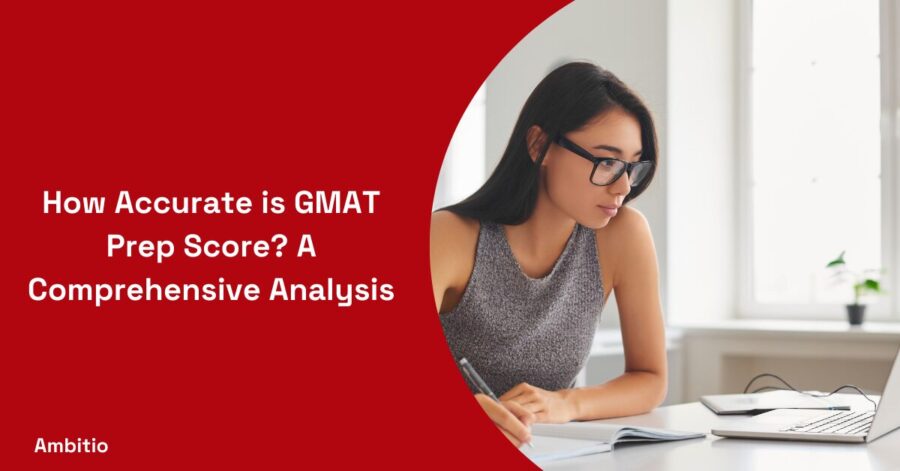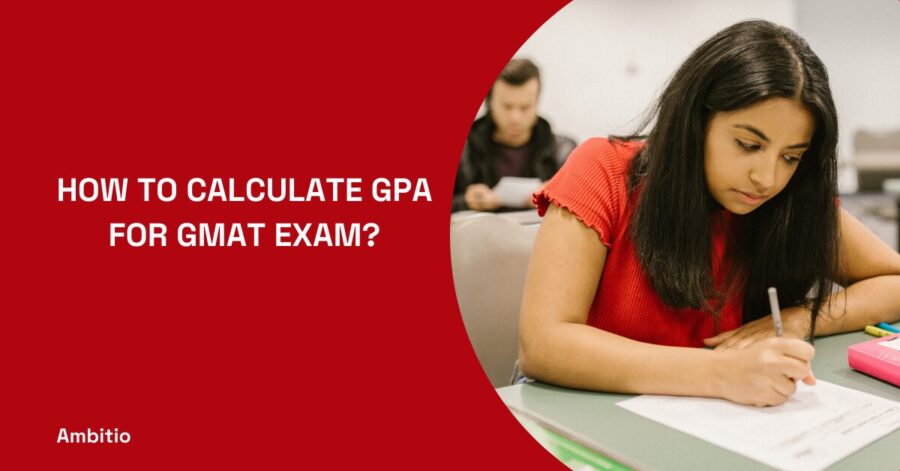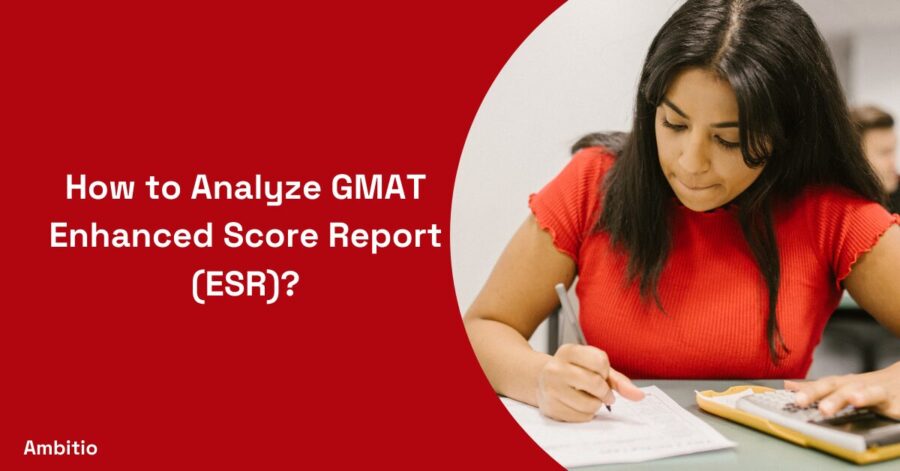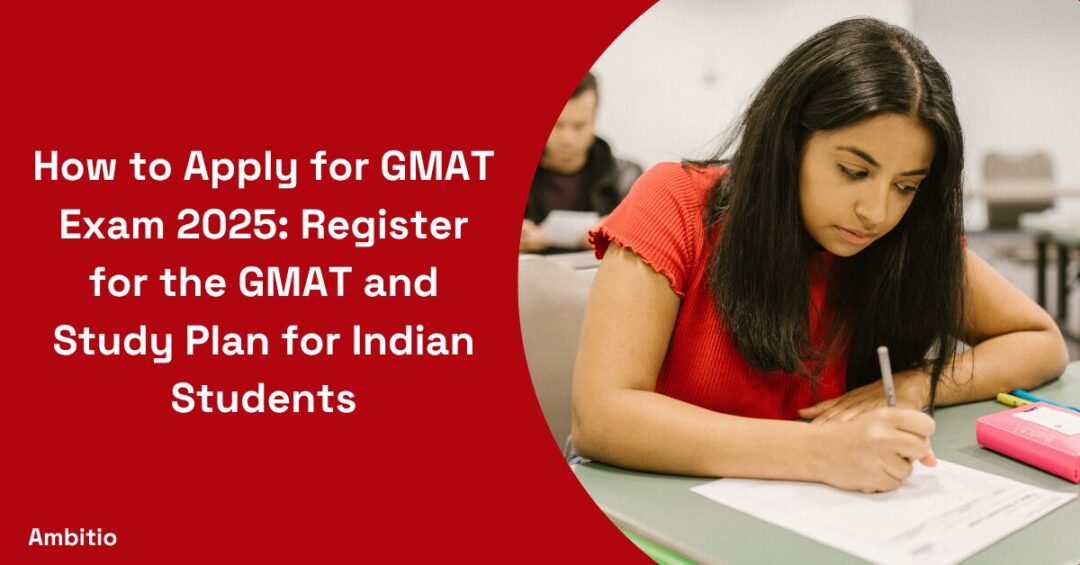17 May 2025
7 minutes read
How Accurate is GMAT Prep Score? A Comprehensive Analysis

Key Takeaways
- How accurate is GMAT prep score? While official practice tests are the best predictors, test conditions, anxiety, and adaptive scoring can cause discrepancies on the actual GMAT.
- Mastering time management, question selection, and test pacing is more important than relying solely on mock test scores.
- Taking at least 80% of your practice tests under real GMAT conditions improves score reliability and test-day confidence.
Just imagine: you take a GMAT practice test and are ecstatic to find 730 on your scorecard-a dream score for most MBA aspirants. However, one big question needs to be addressed: Can you rely on this score to represent your performance on the real GMAT test? The difference between scores from practice tests and the official GMAT score can be very frustrating and leave test-takers questioning whether they are on the right track with their study plan.
The Graduate Management Admission Test (GMAT) is an adaptive test that evaluates quantitative, verbal, analytical writing assessment (AWA), and integrated reasoning skills. While official practice tests from GMAC aim to mimic the real test, the final score can be influenced by several factors: test format, difficulty on test day, test anxiety, and so on.
In this guide, you’ll learn how GMAT practice tests work, why your practice tests sometimes do not correlate with your total score and best practices to utilize the results of those GMAT practice tests to adjust your GMAT study plan to bring up your percentile ranking.
Is GMAT Prep Harder or Easier Than the Real GMAT?
GMAT prep can feel harder than the real test because it involves mastering a wide range of skills, including time management, critical reasoning, and complex problem-solving. Prep materials often simulate challenging conditions to ensure you’re fully prepared.
However, the actual GMAT might feel more manageable once you’re accustomed to the format and timing. The difficulty depends on individual strengths and preparation, but thorough prep typically boosts confidence, making the real exam feel less daunting.
How Accurate Are GMAT Practice Test Scores Compared to the Real Test?
Many test-takers face this discrepancy, making them question whether GMAT prep tests truly reflect the real exam. While official GMAT practice tests from GMAC are designed to simulate the actual exam, several factors affect their accuracy.

Here’s how practice test scores compare to the real test, and what you should keep in mind during your GMAT preparation.
1. Official GMAT Practice Tests Are the Closest to the Real Exam
GMAC Official Practice Test Questions use the same scoring algorithm as that of the GMAT, thus acting as the best diagnostic test for predicting your final score. The test covers questions of similar difficulty and logic, assuring a test-like environment. They should also give quite accurate scores, although a score is likely to fluctuate a bit more with your testing technique.
2. Mock Tests from Third-Party Platforms Can Vary in Accuracy
GMAT Club tests, Target Test Prep, and other third-party prep tests may not trace GMAC’s scoring algorithm exactly. Some tests that are harder than the actual GMAT may, in fact, underplay your potential, while others to overestimate your ability. GMAT practice exams mean business when driven by big data, telling you just where your strengths lie and where you might want to focus your improvement efforts.
3. Your Performance Can Differ Based on Test Conditions
The scenarios during the preparation period might affect test scores on test day. The time of day, nervousness, stamina, and other factors may all structure one’s actual day of examination performance. Practicing in a realistic test environment increases accuracy; make sure your practice tests imitate the conditions of the real test.
4. Adaptive Scoring and Section Scores Impact the Outcome
The GMAT is an adaptive test, meaning the difficulty level changes in accordance with your performance. A V42 (Verbal 42) on a mock test does not guarantee a V42 on the real GMAT exam; there is a different set of question types and a scoring algorithm that comes into play. Your section scores may be almost the same, but your overall score may differ, based on how the scoring algorithm crunches the numbers.
Best Practices for Using GMAT Practice Test Scores in Your Study Plan
Preparing for the actual GMAT exam requires a strategic approach to analyzing practice test scores.

Instead of just focusing on your final score, using GMAT test guide effectively will help you improve test-taking tips, refine your study plan, and boost your performance.
1. Set Score Benchmarks for Your Target GMAT Score
Your score report should serve as a roadmap rather than just a reflection of your current level. Setting clear score benchmarks will help you track progress and stay motivated.
- Before taking a GMAT test series, determine the GMAT score required for your target business school.
- Use the best GMAT prep tests to gauge where you currently stand and set incremental score benchmarks to track your progress.
- If your score of 675 is below your goal, adjust your test-taking approach rather than just retaking tests.
2. Identify Your Strengths and Weaknesses
Every test-taker has unique strengths and weaknesses, and identifying them through practice questions is essential for areas for improvement.
- Your practice questions reveal crucial insights into your strengths and weaknesses in the GMAT quant topics and the verbal section.
- Focus on areas that need improvement, whether it’s algebra, data-driven decision-making, or critical reasoning.
- Analyze your test report to see how your performance compares to the percentage of test-takers at your level.
3. Adjust Your Study Plan Based on GMAT Prep Results
Your GMAT study plan should be flexible enough to adapt based on practice test results, helping you improve your skill level efficiently.
- If your test-day scores fluctuate, focus on improving your skill level rather than chasing a perfect score report.
- One of the most crucial strategies is to pinpoint weak areas and structure your study sessions accordingly.
- Use tutor-led guidance, GMAT course, or self-paced learning for specific question types that consistently lower your score.
4. How Many GMAT Prep Tests Should You Take?
Finding the right balance in taking mock tests is key—too few and you may be unprepared, too many and you may burn out.
- Aim to take at least 80% of your total practice tests under realistic practice conditions.
- The next test should be treated as an opportunity to refine timing and endurance rather than just checking a score.
- While scores are also important, the real goal is understanding test patterns and improving accuracy.
5. Tips to Simulate Real GMAT Conditions for More Accurate Scores
The closer your practice tests are to the actual GMAT exam, the more reliable your test-day scores will be.
- Take your mock test at the same time of the day as your scheduled GMAT exam.
- Practice in a test-like environment with minimal distractions, just like a test center setting.
- Use official test questions and GMAT-like difficulty levels to ensure your tests accurately reflect the real exam.
- Join study abroad consultants like Ambitio to get expert guidance on GMAT preparation and the university application process. They can help you craft a strong profile, refine your application documents, and secure an offer letter from top universities.
Can You Rely on GMAT Prep Scores for the Official GMAT?
Preparing for the official GMAT can feel like a daunting task, especially when you’re relying on GMAT prep scores to gauge your readiness. Many test-takers wonder: Do these practice tests accurately reflect the real exam? While GMAT-like questions and test-like conditions are designed to simulate the experience, your actual GMAT score can still vary due to several factors.
Here’s what you need to consider before fully trusting your practice test results:
1. GMAT Prep Tests Are a Good Indicator, But Not a Guarantee
Official GMAT practice tests use the same algorithm as the real exam, making them one of the best ways to predict your score. However, even the most GMAT-like practice tests cannot fully replicate the pressure, fatigue, or stress you’ll face on test day.
2. The Right Strategies Matter More Than Just Test Scores
If you’re only focusing on one GMAT score from a practice test, you may miss key insights about your test-taking patterns. The GMAT boldface strategies—like GMAT time management, question prioritization, and error analysis—can significantly impact your final result.
3. Your Performance Will Fluctuate Based on Testing Conditions
The environment in which you’re taking the test affects your focus. A distraction-free setting at home is different from a proctored test-like center. Fatigue also plays a role—you’ll see differences in your performance if you take multiple tests under different conditions.
4. Take At Least 80% of Your Mock Tests in Realistic Conditions
To get the most reliable predictions, take at least 80% of your practice tests under strict test-like conditions. This means using official GMAT questions, following the exact timing, and avoiding pauses or breaks that wouldn’t happen in the real test.
5. Your GMAT Score Reflects More Than Just Practice Tests
GMAT prep tests are a great GMAT focus tool, but your final score will depend on how well you adapt to the real exam’s question types, pacing, and difficulty shifts. You’ll see the best improvements by combining practice tests with targeted revision, reviewing mistakes, and using the right strategies to improve weaker areas.
Conclusion
While GMAT prep scores provide a strong estimate of your performance, they are not an absolute guarantee of your official GMAT results. To maximize accuracy, ensure that your practice tests are taken in real exam conditions, analyze your mistakes, and refine your strategies. The key to success isn’t just taking tests—it’s learning how to take the GMAT effectively!
Get a personalized study plan, expert guidance, and AI-driven insights to boost your GMAT score. Master test-taking strategies, tackle GMAT-like questions, and get closer to your dream MBA. Don’t settle for guesswork, upgrade to Ambitio Pro today!
FAQs
Are GMAT Prep tests easier or harder than the real GMAT?
They’re generally considered comparable in difficulty to the real GMAT.
Why might my practice test scores differ from my actual GMAT score?
Test anxiety, test center environment, and other external factors can cause score differences.
Do official practice tests use the real GMAT scoring algorithm?
Yes, official practice tests use the same algorithm as the actual GMAT.
How accurate are third-party practice tests?
Accuracy varies; official tests are the most reliable as they use the real GMAT scoring algorithm.
What can I do if my practice test scores don’t match my actual GMAT scores?
Identify the reasons for the difference, such as test-day anxiety, and address them.
How many questions can I miss to get a specific score?
It depends on the difficulty level of the questions you miss due to the computer-adaptive nature of the test.
How much can GMAT scores vary?
GMAT scores typically vary plus or minus 50 points from your “true score”.

You can study at top universities worldwide!
Get expert tips and tricks to get into top universities with a free expert session.
Book Your Free 30-Minute Session Now! Book a call now




























